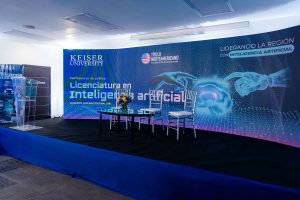Bachelor of Science in Management Information Systems
Keiser University’s Bachelor of Science in Management Information Systems (MIS) bridges the gap between business and technology. This program equips students with the knowledge and practical skills to design, manage, and implement information systems that drive organizational success. From hardware and networking to programming and database management, students learn how technology supports strategic decision-making and business growth. The program emphasizes hands-on learning, giving students opportunities to collaborate on real projects with community organizations, building both technical expertise and professional experience.
What You’ll Gain as a Graduate
As a graduate of Keiser University’s MIS program, you’ll be able to:
- Solve business problems with technology. Apply tools and methodologies to analyze organizational challenges and deliver effective, technology-driven solutions.
- Master core IT skills. Build strong capabilities in programming, database design, networking, and systems management to support and optimize business operations.
- Communicate with impact. Translate technical concepts into clear, professional communication for both technical and non-technical audiences.
Career Pathways & Outcomes
Graduates of the MIS program are prepared for diverse career opportunities where technology and business intersect. Possible roles include:
- Business Systems Analyst
- IT Project Manager
- Database Administrator
- Information Systems Manager
- Network or Systems Administrator
- Technology Consultant
With experience, graduates may advance into leadership roles overseeing enterprise IT strategy, digital transformation, and business innovation.
Why This Program?
- Blended focus on business and technology – gain a dual perspective that employers value.
- Hands-on project experience – work directly with organizations to solve real business challenges.
- Career versatility – prepare for roles across industries including finance, healthcare, government, and technology.
- Supportive learning environment – small class sizes, mentorship, and opportunities to connect with peers and professionals.
- Future-ready skills – graduate with both technical expertise and business acumen, positioning you for long-term career growth.










